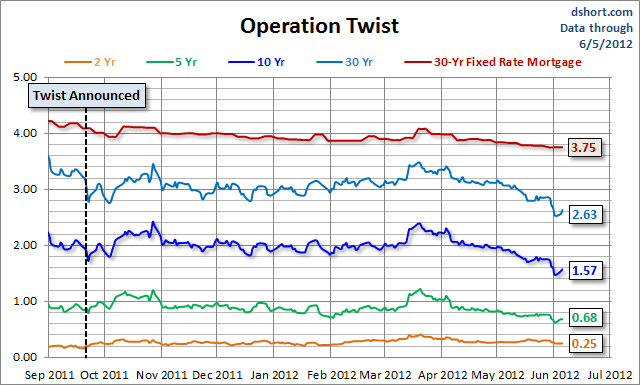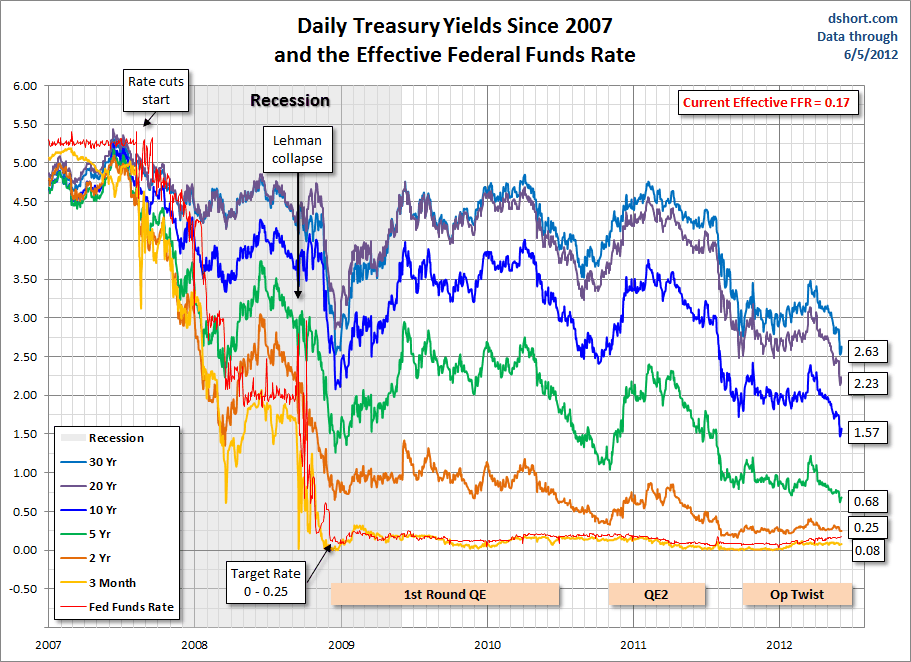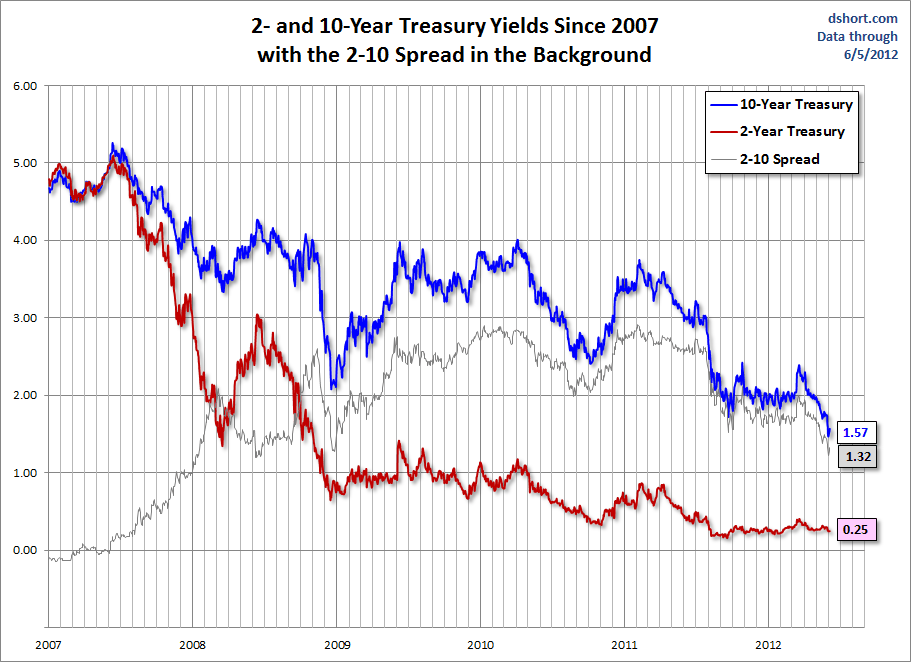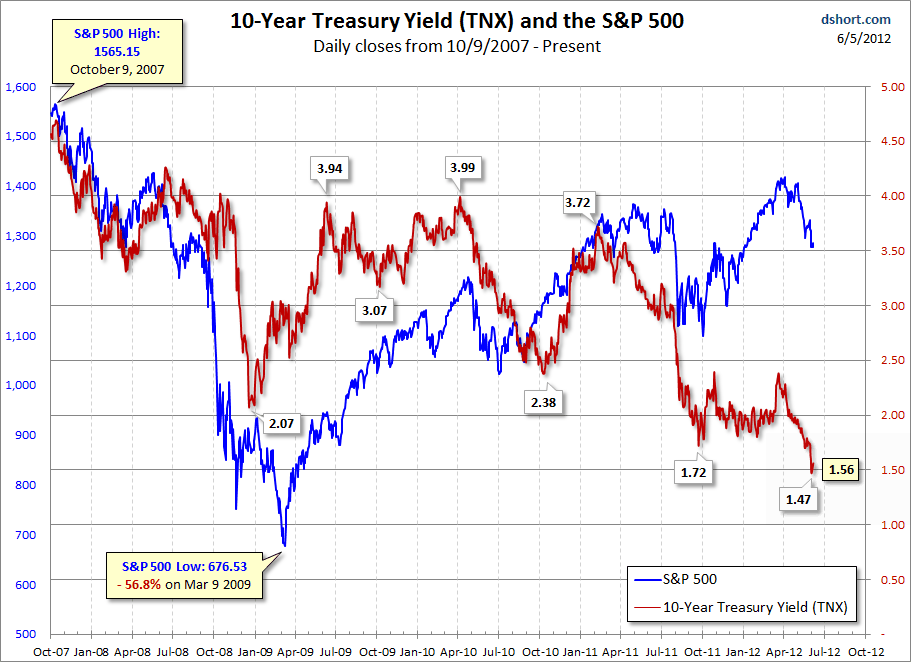The Fed's latest strategy for managing the economy, Operation Twist, has a month to go. The program was announced on September 21st of last year with the stated purpose of selling $400 billion in shorter-term Treasury securities by the end of June 2012 and using the proceeds to buy longer-term Treasury securities. The Fed assumed this would put downward pressure on longer-term rates, which would stimulate the economy through "a broad easing in financial market conditions." In other words, more loans at lower rates.
How effective has this strategy been? Here is a snapshot of selected yields and the 30-year fixed mortgage since the inception of Operation Twist.
At face value, it would appear that the Fed has been successful in driving rates lower. However, the extreme plunge in Treasury yields at 5-years and longer was presumably not part of the Fed's goal. We can attribute this trend to financial fears around the world as the Eurozone teeters on disaster and emerging markets appear increasingly wobbly as well.
The 30-year fixed mortgage, according to the latest Freddie Mac weekly survey, is at its all-time low at 3.75. That probably suits the Fed just fine. But as for loans to small businesses, the Fed strategy is a solution to a non-problem. Here's a snippet from the latest NFIB Small Business Economic Trends report:
Financing remained low on the list of concerns for business owners. Only 3 percent cited financing as their top business problem. Ninety-two (92) percent reported that all their credit needs were met or that they were not interested in borrowing.
It will be interesting to watch yields during the final month of Operation Twist. How much further can they drop? And, given the growing signs of weakness in the US jobs market, is there anything useful that the Fed can do as a post-Twist cure for an ailing economy?
Background Perspective on Yields
The first chart shows the daily performance of several Treasuries and the Fed Funds Rate (FFR) since 2007. The source for the yields is the Daily Treasury Yield Curve Rates from the US Department of the Treasury and the New York Fed's website for the FFR. 
The next chart shows the 2- and 10-year yields with the 2-10 spread highlighted in the background. 
The final chart is an overlay of the CBOE Interest Rate 10-Year Treasury Note (TNX) and the S&P 500. 
For a long-term view of weekly Treasury yields, also focusing on the 10-year, see my Treasury Yields in Perspective.
- English (UK)
- English (India)
- English (Canada)
- English (Australia)
- English (South Africa)
- English (Philippines)
- English (Nigeria)
- Deutsch
- Español (España)
- Español (México)
- Français
- Italiano
- Nederlands
- Português (Portugal)
- Polski
- Português (Brasil)
- Русский
- Türkçe
- العربية
- Ελληνικά
- Svenska
- Suomi
- עברית
- 日本語
- 한국어
- 简体中文
- 繁體中文
- Bahasa Indonesia
- Bahasa Melayu
- ไทย
- Tiếng Việt
- हिंदी
Treasuries Update: Yields Are Off Their Historic Lows
Published 06/07/2012, 01:40 AM
Updated 07/09/2023, 06:31 AM
Treasuries Update: Yields Are Off Their Historic Lows
Note from dshort: Here is an updated snapshot of Tuesday's closing yields. They are off the historic lows set last Friday in the 5-, 7-, 10-, 20- and 30-year Treasuries. Yesterday morning, market futures were up and CNBC was reporting that "The European Central Bank held its key interest rate unchanged and extended some of its liquidity providing operations to help financial markets cope with the effects of the euro zone's debt crisis but stopped short of announcing any big measures on Wednesday."
Latest comments
Loading next article…
Install Our App
Risk Disclosure: Trading in financial instruments and/or cryptocurrencies involves high risks including the risk of losing some, or all, of your investment amount, and may not be suitable for all investors. Prices of cryptocurrencies are extremely volatile and may be affected by external factors such as financial, regulatory or political events. Trading on margin increases the financial risks.
Before deciding to trade in financial instrument or cryptocurrencies you should be fully informed of the risks and costs associated with trading the financial markets, carefully consider your investment objectives, level of experience, and risk appetite, and seek professional advice where needed.
Fusion Media would like to remind you that the data contained in this website is not necessarily real-time nor accurate. The data and prices on the website are not necessarily provided by any market or exchange, but may be provided by market makers, and so prices may not be accurate and may differ from the actual price at any given market, meaning prices are indicative and not appropriate for trading purposes. Fusion Media and any provider of the data contained in this website will not accept liability for any loss or damage as a result of your trading, or your reliance on the information contained within this website.
It is prohibited to use, store, reproduce, display, modify, transmit or distribute the data contained in this website without the explicit prior written permission of Fusion Media and/or the data provider. All intellectual property rights are reserved by the providers and/or the exchange providing the data contained in this website.
Fusion Media may be compensated by the advertisers that appear on the website, based on your interaction with the advertisements or advertisers.
Before deciding to trade in financial instrument or cryptocurrencies you should be fully informed of the risks and costs associated with trading the financial markets, carefully consider your investment objectives, level of experience, and risk appetite, and seek professional advice where needed.
Fusion Media would like to remind you that the data contained in this website is not necessarily real-time nor accurate. The data and prices on the website are not necessarily provided by any market or exchange, but may be provided by market makers, and so prices may not be accurate and may differ from the actual price at any given market, meaning prices are indicative and not appropriate for trading purposes. Fusion Media and any provider of the data contained in this website will not accept liability for any loss or damage as a result of your trading, or your reliance on the information contained within this website.
It is prohibited to use, store, reproduce, display, modify, transmit or distribute the data contained in this website without the explicit prior written permission of Fusion Media and/or the data provider. All intellectual property rights are reserved by the providers and/or the exchange providing the data contained in this website.
Fusion Media may be compensated by the advertisers that appear on the website, based on your interaction with the advertisements or advertisers.
© 2007-2025 - Fusion Media Limited. All Rights Reserved.
